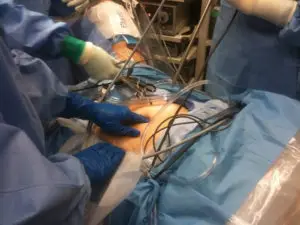
The Pennsylvania Supreme Court has agreed to hear a case that has significant implications for the introduction of evidence regarding the known risks of a medical procedure in medical malpractice cases.
In May 2012, the plaintiff had a laparoscopic hysterectomy performed by the defendant obstetrician-gynecologist. During the surgery, the doctor perforated the plaintiff’s bowel. The plaintiff sued the doctor, his practice group and the hospital for medical malpractice, based on negligence. She alleged that the doctor breached his duty of care by failing to identify her bowel prior to cutting it.
At trial, the defendant presented evidence that bowel perforation is a known risk of hysterectomies, and the plaintiff’s injury was a complication of surgery, not negligence. The plaintiff objected to the introduction of any evidence regarding known risks, claiming that such evidence was not relevant to whether the doctor breached the standard of care, and such evidence could mislead the jury by suggesting that the plaintiff’s injuries were the result of a known surgical complication, rather than negligence. The trial court allowed the known risk evidence.
Since the plaintiff did not make any claim that the doctor had failed to obtain her informed consent or failed to advise the plaintiff of the potential risks associated with the surgery, the trial court excluded all evidence related to the plaintiff’s consent to undergo the procedure.
At trial, expert witnesses presented opinions regarding the cutting of the bowel, and the proper standard of care during a hysterectomy. The defendant’s expert witnesses testified that even during a properly performed hysterectomy, bowel injury is a common risk. The jury found for the defendant.
The plaintiff appealed to the Superior Court, which, relying heavily on the Pennsylvania Supreme Court’s recent holding in Brady v. Urbas, reversed the trial court and ordered a new trial, ruling that the evidence regarding the risks and complications should not have been admitted, as it was not relevant to the issue of whether the defendant met the proper standard of care.
The defendant appealed to the Supreme Court, which will consider the appeal only with regard to the issue of whether the Superior Court’s holding conflicts with the Supreme Court’s holding in Brady v. Urbas, which permits the admission of evidence of general risks and complications in a medical liability claim.
If the Supreme Court does not overturn the lower court’s ruling, trial judges will be unable to suppress expert witness testimony on the known complications of a medical procedure, and Pennsylvania physicians could face more medical negligence cases. An amicus brief filed by various medical societies to the Supreme Court states that “the upshot will be that any patient can sue a surgeon or physician for any complication or unavoidable risk and a patient will be able to recover against a physician in the absence of negligence where the complication that occurred could not have been avoided even with the utmost care.”

